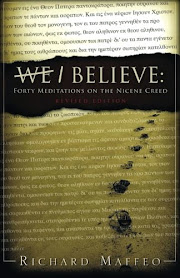Now
here is an absurd visual: A soldier going into heavy battle replacing his steel
helmet with a cloth ball cap.
I
thought of that silly image this morning as I read through 1 Thessalonians and
got to 5:8 –
“But
since we are of the
day, let us be sober, having put on the breastplate
of faith and love, and as a helmet, the hope
of salvation.”
I checked the Greek dictionary for the word St Paul used here and translated
‘hope.’ The Greek word, elpis, is not defined as a ‘maybe’ hope –
like saying, “I hope it will not rain Saturday,” or, “I hope I get that
promotion.”
It might or might not rain on Saturday. And the person might or might
not get that promotion.
But the New Testament Greek word, elpis, is much more definite than a wishful hope. The Greek word means
a ‘confident expectation’ that something will and without reason to doubt – it WILL
occur.
Why will it occur? Because elpis,
as used by the New Testament writers, is rooted and anchored in the promises
of almighty God.
Another Bible translation, The New Living Translation, recognizes
the nuance of elpis when it
translates verse 8 this way: “But let us who live in the light be clearheaded,
protected by the armor of faith and love, and wearing as our helmet the
confidence of our salvation.”
Did you catch that? “The CONFIDENCE of our salvation” is our
helmet, a head covering stronger
even than the steel ones worn by soldiers on the battlefield. That helmet God provides is our protection against all the flaming arrows of the evil one. It shields us from
his seductive lies that whisper, “Ahhh, you never can know of your salvation
until you die.”
But
God tells a different story. Here are only a few Biblical promises in which
every Christian can place complete and utter confidence:
John
3:36 “Whoever
believes in the Son has eternal life, but whoever disobeys the Son will not see life,
but the wrath of God remains upon him.” (Just as an aside, “belief” in
the New Testament is always characterized by obedience”).
John 5:24 “Amen, amen, I
say to you, whoever hears my word and believes in the one who sent me has eternal life
and will not come to condemnation, but has passed from death to life.”
1
John 5:13 “I
write these things to you so that you may know that you have eternal life,
you who believe in the name of the Son of God.”
Please note those verb tenses. They are all in the present tense. In
other words, if you believe, then you have.
That’s why the New Testament letter to the Hebrews tells us: “[S]o that by two
unchangeable things in which it is impossible for God to lie, we who have taken
refuge would have strong encouragement to take hold of the hope set before us. This hope we have as an anchor of the soul,
a hope both sure and steadfast
and one which enters within the veil, where Jesus has entered as a forerunner for us,
having become a high priest forever according to the order of Melchizedek. (Hebrews 6:18-20).
What kind of headgear are you wearing in the
spiritual battle raging around us? If it’s cloth, then take it off and replace
it with the impenetrable helmet of a confident expectation that God will do as
He promises to do for all who follow Jesus as Lord, Master, and Savior.

